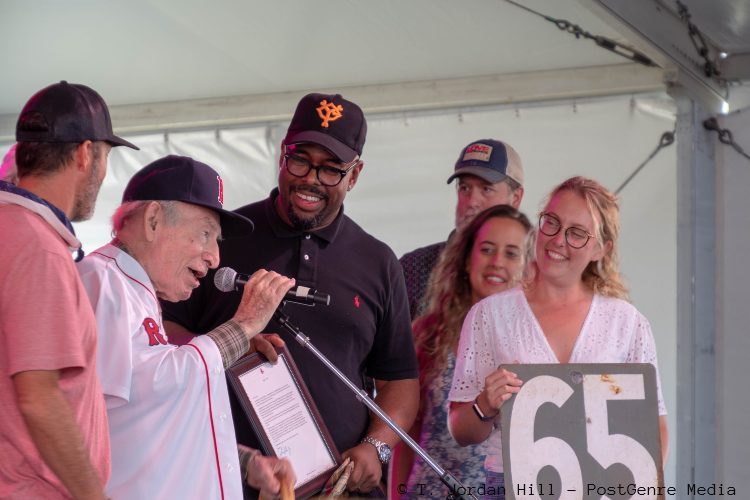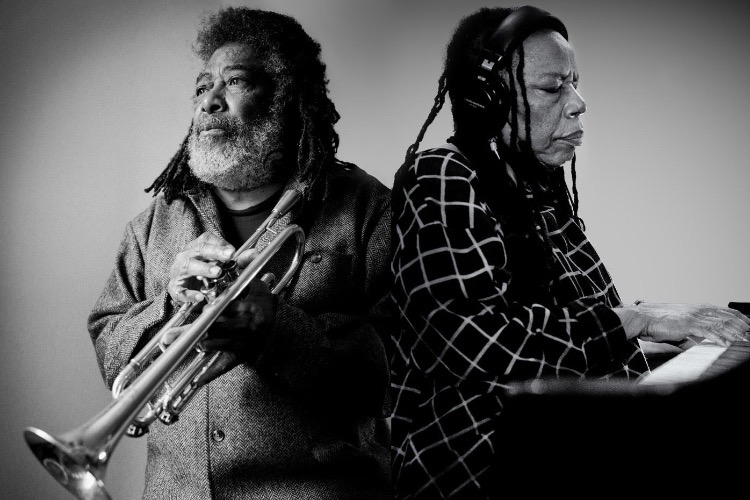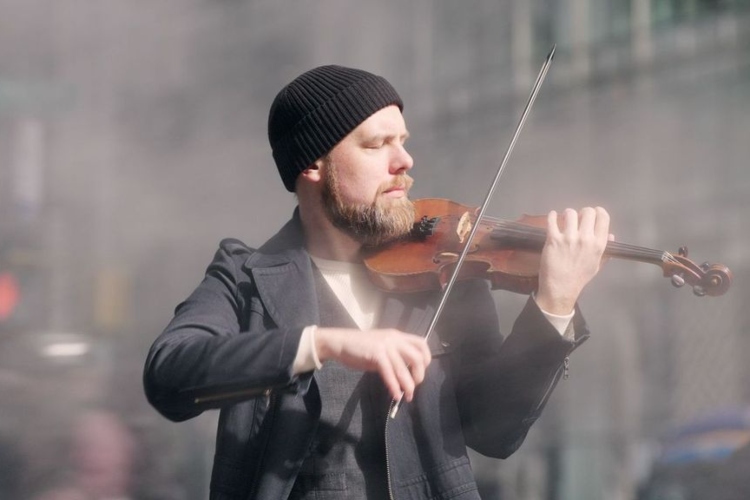Newport Jawn: A Conversation with Christian McBride (Part Two)
|
Getting your Trinity Audio player ready...
|
We continue our conversation with Christian McBride by discussing his thoughts on the connection between music and sports, his work as a DJ, the concept of genre, and some more on the Newport Jazz Festival and his role as its Artistic Director. Part one of our discussion can be found here.
PG: Miles Davis used to see parallels between the rhythms of boxing and those in music. As an avid sports fan, do you see a connection between sports and your music?
CM: All the time. Certainly in terms of preparation and improvisation. A lot of people still don’t quite get that when musicians are improvising, we’re following a plan. There’s a structure. Now, you learn that structure thoroughly so you know how to express yourself within that structure and toy with it. You learn where the so-called boundaries are and use those as points of where to find your artistic freedom. Those sort of boundaries are what make freedom that much sweeter, right?
In sports, it is the same thing. You learn a playbook and how a play is supposed to go. You learn the diagrams with Xs and Os. And how if you do a certain move, the defense will generally respond a certain way. But once you are actually in the game, all of that could go completely awry. None of what you practiced may happen on the field, on the court, in the diamond, in the ring, or whatever it is. So, you gotta improvise. You can’t do that skillfully unless you study your craft thoroughly. And that’s the same thing with jazz.
PG: It seems those skills would also transfer to when you perform as a DJ. How did you get into DJ-ing?
CM: Oh, it was kind of flukey. In 2013, I received a call to perform with a James Brown All-Star tribute band at Tipitina’s in New Orleans. The gig was a birthday party for DJ Soul Sister, who works at WWOZ. She is one of the most well-known personalities in New Orleans. DJ Soul Sister performed before we played our set. I was on the side of the stage watching her and what she was able to do with just two turntables and records was incredible. No special effects, no Serato, no digital anything. And the place was going wild. I had not seen anything like that – where a DJ was mesmerizing an audience with just the basics – since probably since the 80s. It was fascinating to me and I thought, “I can do that.” [laughing]. I came home and started having this crazy idea of starting a side hustle as a DJ. I did my first DJ gig in 2014. I don’t do it that often, but I think I’ve gotten enough practice that I don’t make a complete fool out of myself.
PG: Your name for those performances, DJ Brother Mister, came from James Brown’s nickname for you, correct?
CM: That’s right.
PG: How do you feel your experience working with James Brown has shaped your other music?
CM: Well, I never really got to be around James Brown nearly as much as I was someone like Chick Corea. I only got to be around Mr. Brown a couple of times. His force of nature has been well documented on the public record for many years. I got caught in that hurricane of James Brown’s personality or whatever you want to call it. But you can see the results of what he created and his legacy. He basically created a whole new style of music. Was he like Chick Corea? [laughing] No. But you obviously can’t argue with the results, you know? One of the things I learned from James Brown was that it is OK to entertain people, even if your music is very deep and intellectual. Encase the substance in some showmanship and people are quicker to embrace it, I think.
PG: In addition to Corea and Brown, you’ve worked with so many other artists from across the musical spectrum throughout your career. The list is impressive. Is there someone, not genre specific, that you wish you could perform with but have not yet?
CM: The two people on my bucket list are Gladys Knight and Dolly Parton. I don’t know how it’s going to happen, but I have to work with both of them sometime during the next twelve to fifteen months.
PG: Jay may be able to help you with Dolly. [Ed. Jay Sweet, the Producer of the Newport Festivals Foundation arranged for Parton to perform at the Newport Folk Festival in 2019] [laughing].
CM: Well, you know, I was actually in touch with Dolly’s people maybe two or three years ago. I went to Nashville for a piece for Jazz Night in America with my NPR team and we were trying to get her to do a duet with me for the show. Much to my shock, her manager got back to me and said that while he was sure Dolly would be into it, she was out of town at the time. He asked me to let him know the next time we were in Nashville so we would see if we could work it out. I’m going to make it happen somehow.
PG: You have mentioned in other interviews that you were checking out Bob Wills and the Texas Playboys, the Time Jumpers, and bluegrass music. What got you interested in exploring that country/western swing/bluegrass region of music?
CM: Well, that happened once I got to be good friends with Edgar Meyer. Edgar was the one that really kind of schooled me on bluegrass. Edgar and I are both professional musicians and artists, so are always looking to learn more about music. We sort of mutually agreed that I would teach him about James Brown and all the soul music that I love if he would teach me about bluegrass and country music. We had a nice trade-off.
PG: That gets into a broader question about music. What are your thoughts on the concept of genre?
CM: In some ways, genre is kind of like race. They are both sort of the same thing to me. You have Blacks, whites, Asians, Latinx, whatever. But at the core, if we’re talking about the core, we’re all people, right? If you look at genres – jazz, funk, hip hop, classical, Latin – ultimately it is all music. If you want to separate these things you ultimately run the risk of getting yourself in some situations where you might not need to be. In terms of genre, I think the focus on genre was not created by artists in the first place. It was created by someone else.
PG: Labels and promoters.
CM: That’s right, by business people to sell the music. And sometimes we buy into that too deeply. But, listen, it is all within reason. Would you see me book Iron Maiden for Newport? Probably not. [laughing]. Will we ever see a mosh pit on the Fort stage? I can’t rule it out. I can’t ever see it happening, but you never know. Somebody in Maria’s Schneider’s big band might just get the feeling and jump off the stage. Who knows? [laughing].
I realize what our community champions, what is important to us, and whose voice needs to be heard. I try to keep that in mind. If that means paying attention to genre, so be it. But at the same time, I love the Roots. I love Common. I love George Clinton. As far as I am concerned, they all come from the same tree of Black American Music. Same with Living Colour. When I had them at Newport in 2018, that was a hoot, man.
PG: Do you feel the history of the Festival has shaped your role in selecting these “jazz adjacent” artists? For instance, when you are picking artists outside of the jazz mainstream, are you considering things like the performances of Sly and the Family Stone or James Brown at Newport in 1969?
CM: Well, not consciously. I think my first thought is to really make sure the core of the Festival is set with the important voices in the jazz world and in our community, artists like Kenny Barron and Kenny Garrett. But running a Festival is also a business. You need to be able to both enlighten people inside and outside of the community while selling tickets. It’s just how it goes, you know? And that thought is secondary. I want to make sure, at least from where I stand, that your core jazz artists are represented. And then you top it off with someone like Andra Day, Ledisi, or Trombone Shorty, who I also believe are incredible artists. It is not a big stretch to me to have those types of artists at the Festival as well.
PG: That makes sense, but some people get a little stuck on categories and strict definitions.
CM: Oh yeah, oh yeah. Unfortunately, as I’ve said before, jazz fans are like foodies. I say that lovingly but they’re going to take a microscope and find anything they can get you on. [laughing]
PG: So, for instance, you encountered some blowback from a few long-time attendees when you booked the Roots in 2017. Did that reaction surprise you at all?
CM: Oh, absolutely not. You expect that. From 2006 to 2010, I was creative chair of jazz programming with the LA Phil. When I first started there, the woman who hired me, Laura Connelly, warned me that there were a lot of jazz subscribers who are very opinionated. They wrote letters all the time and tended to be quite vociferous in their opinions no matter who was involved. She stated that people had written letters about Oscar Peterson, Joe Zawinul, Michael Brecker. I was shocked, “You mean complaining?!?” And she stated that as much as she hated to say it, jazz fans are a tough crowd. [laughing]. Oh boy! So, I had my training and was prepared when it came time to book the Roots.
PG: Since you mentioned race in reference to genre, one of the most beautiful things about the Newport Jazz Festival has been the audience’s diversity. There are people from all different walks of life loving the music and being respectful of one another. What are your thoughts on the power of music to bring people together?
CM: Music is the only thing I think can really do it the right way. The State Department used to send musicians on tours to places in Eastern Europe or Central America as a peace offering of sorts, as a way to share some of the best of what America has to offer. That needs to happen on a grander scale. A lot could be accomplished if musicians would be treated as world ambassadors.
PG: In trying to represent the core while expanding outwards, what exactly is your process for selecting artists for Newport?
CM: It’s not really that scientific. I just sit down and write a wish list of people I would like to see. I keep my eyes and ears open to see who is getting hot and making a splash in our community. Jay [Sweet] has always been very good at booking the bigger ticket people like Common or George Clinton because he knows all of their agents. So, Jay handles some of those top-tier ticket seller artists while I take care of everything else in the jazz community. That is kind of how it works. It’s also very interesting for me because I have a personal or professional relationship with pretty much every single person who plays the Festival. Since I have a friendship or working relationship with everyone, I sincerely hope that they all know that I will strive to make everyone as comfortable as possible.
PG: What has been your favorite moment with George Wein?
CM: Hmmm. What has been my favorite moment with George Wein? I’ve had quite a few of them. I think my all-time favorite moment with George Wein will always be when he asked me if I would be interested in taking the artistic directorship position. He called me over to his apartment in October of 2015 and began sharing with me stories about the history of the Festival. A lot of it I knew, but some of it I didn’t. At the end, he told me that he and the Foundation’s Board had been working on his succession plan and trying to find a new Artistic Director. I figured he was going to ask me for recommendations but instead told me that he thought I was the right man to take over the position. I had no idea that George Wein paid that much attention to things that I was doing, you know? I often tell young students to always do their best because when you think no one’s watching, somebody’s watching. That day was an example of that.
PG: Who would you like to see perform at Newport but has not been there yet?
CM: Well, you know, I was surprised that before 2019 Dee Dee Bridgewater had only played Newport once in her entire career, and that was for a Friday night thing at the Tennis Hall of Fame. She had never performed on the Fort stage before. I’m going to make sure that we get Dee Dee back a lot in the future. Beyond that? You have people like Pat Metheny, Herbie Hancock, Bill Frisell, or Charles Lloyd that have been at Newport many times. They’re family members, so you know they will always come back.
PG: What do you see in the Newport Jazz Festival’s future?
CM: Anytime I’m asked a question about the future, I always say that one of the beautiful things about living life is that you never know what will happen. This festival has been around for a long time. This will be its 67th year – or 66th if you don’t count last year since there was no 2020 festival- and I don’t think anyone was able to predict all that happened during that time. But I see Newport’s future as something bright, consistent, and a pleasure, for all music lovers, particularly jazz lovers.
The 2021 Newport Jazz Festival will take place from July 30th to August 1st at Fort Adams State Park. We plan to have live coverage of the event. More information can be found on the Festival’s website. Christian McBride will be performing at the Festival with two groups. The first, A Christian McBride Situation, will take the Lawn Stage from 1:30 PM to 2:30 PM on Friday, July 30th. The second, The Jam Jawn with John Scofield, Marco Benevento, and Joe Russo will perform on the Lawn Stage from 4:30 PM to 5:30 PM.
More information about Christian can be found on his website.




One thought on “Newport Jawn: A Conversation with Christian McBride (Part Two)”